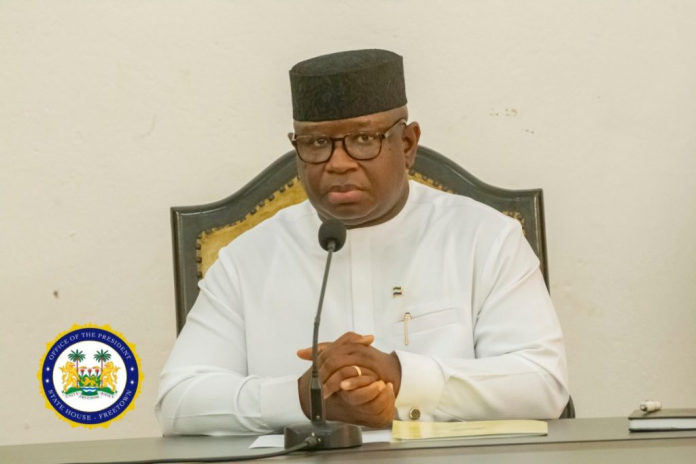By Amin Kef (Ranger)
There is no denial of the fact that the ruling SLPP led Government under the indefatigable leadership of President Julius Maada Bio is keen on transforming Sierra Leone into a middle-level country. It is on record that in trying to achieve meaningful socio-economic transformation the President has been endeavouring to encourage investments into various sectors. In as much as the Government has been luring direct foreign investment, putting the right parameters in place, it has also been
desirous in driving local entrepreneurship of which local manufacturing, innovation are key aspects.
What is today apparent in the economic trajectory of the country is the outlining by the Government of ambitious programmes as encompassed in President Bio’s five game changers, Feed Salone, Human Capital Development, Youth Employment Scheme, Public Transformation and Technology which it is determined to roll out.
Rolling out these game changers definitely require funding and in trying to mobilize the needed funding, imposition of taxes will form a key role in addition to donor funding. However, it could be counter-productive and inimical to economic transformation if manufacturing industries are targeted, through the imposition of burdensome taxes with the aim of generating revenue to actualize those game changers. Instead, of them becoming potential sources of revenue mobilization, their growth and activities will only be stifled or hampered.
Members of Parliament, who are the representatives of the people, should realize that their key responsibility is to promote the interest of their constituents. They must be mindful of the fact that when local manufacturing industries or companies bear heavy tax burdens such will have corresponding negative impact on the standard of living of their constituents, in the form of higher prices of the goods and services local manufacturers produce or offer.
Understandably, Members of Parliament should not blame the local manufacturers of selling their goods or offering their services at higher prices when cognizance is taken of the high cost of production involved and the higher taxes that they incur.
It is therefore incumbent on them to realistically advocate, on behalf of local manufacturers, for favourable taxes, whenever Finance Acts are tabled before them in Parliament.
Also, Government must note that while imports serve the vital purpose in supplying goods and services, a robust economic landscape should necessitate the growth and sustainability of local manufacturing.
In as much as the Government is trying to encourage local manufacturers to thrive, it should institute tax policies that favor them over importers of consumer goods and services. It goes without saying that a well-structured tax regime holds the potential to substantially invigorate the economy, fostering self-sufficiency and prosperity.
Significantly, if Government is to actualize its plan to create 5,000 jobs for the youth, as one of its game changers, then it is important for tax regimes to be put in place that encourage local manufacturers to thrive and expand. Their businesses will not only generate employment opportunities for both skilled and unskilled labor but also play a pivotal role in reducing unemployment rates.
Indisputably, the expansion of the manufacturing sector will lead to heightened economic activity, propelling GDP growth and encouraging investments in technology, infrastructure, and innovation, ultimately resulting in a flourishing industrial foundation.
Rationally speaking, when favourable tax regimes are in place there will be zest, on the part of local manufacturers, to expand and others will feel free or be enthusiastic to invest. When such materializes there will be decreased reliance on imported goods, as incentivized local manufacturers provide consumers with domestically produced alternatives, reducing the need for foreign products.
Tax incentives, including reduced corporate income tax rates, investment tax credits, and accelerated depreciation for manufacturers, can stimulate economic growth and attract investments in local production. Also, adjustments to customs and import duties can favor domestic goods, making imported products comparatively more expensive, stimulating domestic consumption.
Against this backdrop, the Government, under President Bio’s astute leadership which prioritizes investments to drive economic development must be considerate in levying taxes on local manufacturers.
Members of Parliament must also play a key advocacy role geared towards protecting local manufacturing entities from bearing the brunt of burdensome tax regimes otherwise they will be deemed as doing nothing to seek the interest of their constituents.
By implementing favourable tax policies, President Bio and Members of Parliament can inspire entrepreneurship among local manufacturers. Reduced tax burdens create breathing room for these businesses, allowing them to invest in research, innovation and skilled labour. This in turn enhances productivity, quality and competitiveness.
Through collaborative efforts and strategic policymaking, Sierra Leone can pave the way for a prosperous future where local manufacturers thrive and contribute meaningfully to the nation’s development.




